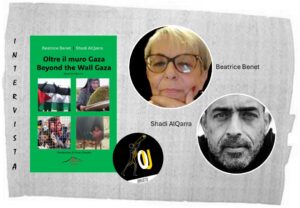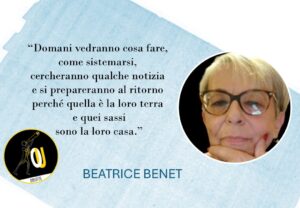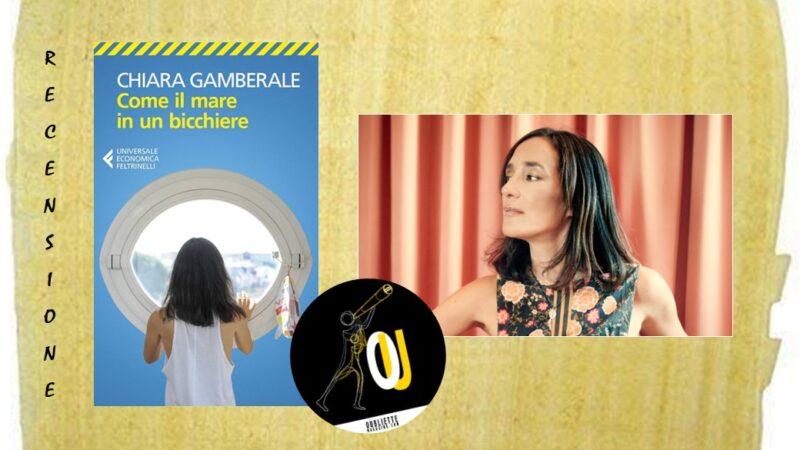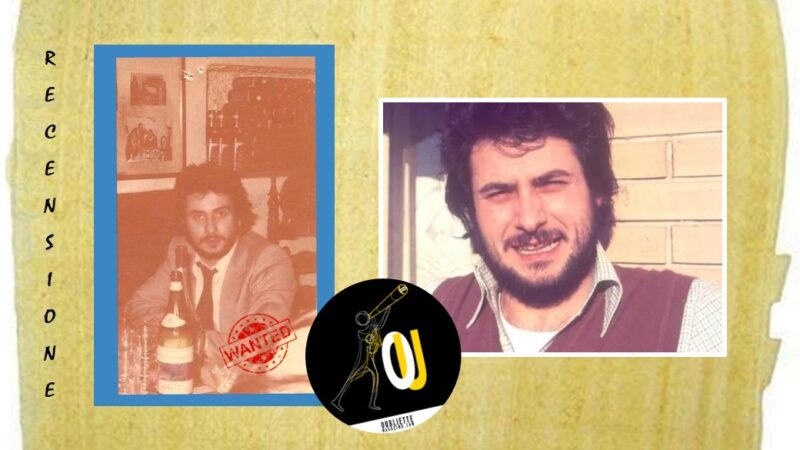Intervista a Beatrice Benet e Shadi AlQarra: vi presentiamo la seconda edizione de “Oltre il muro Gaza”
“Domani vedranno cosa fare, come sistemarsi, cercheranno qualche notizia e si prepareranno al ritorno perché quella è la loro terra e quei sassi sono la loro casa.” ‒ dal racconto “Fuga nella notte” de “Oltre il muro Gaza ‒ Beyond the Wall Gaza”

Fresco di seconda edizione con Tomarchio Editore, “Oltre il muro Gaza ‒ Beyond the Wall Gaza” di Beatrice Benet e Shadi AlQarra si presenta come una miscellanea di fotografie, poesie, brevi racconti e citazioni che mostrano con occhio attento la realtà della città di Gaza.
Pubblicato in prima edizione nell’agosto del 2024 con prefazione di Moni Ovadia, questa nuova edizione vede circa 60 pagine in più. I nuovi scatti fotografici di Shadi AlQarra mostrano una città completamente diversa, i colori ed i soggetti malgrado la malinconia di ciò che non è più presente sono pervasi dalla forza della vita che sempre imperterrita continua malgrado le difficoltà. Perché ogni trauma può essere occasione di cambiamento ed ogni turbamento occasione di viaggio interiore alla ricerca della pace e del perdono.
Non indugio oltre e lascio ai lettori le risposte di Beatrice Benet e Shadi AlQarra (sottostante si potrà leggere l’intervista completa in lingua inglese).
A.M.: Cari Beatrice e Shadi sono lieta di poter presentare ai lettori la seconda edizione del volume “Oltre il muro Gaza – Beyond the Wall Gaza”. Perché avete sentito la necessità di aggiornare il libro?
Beatrice Benet: Ciao Alessia, sono sempre felice di parlare con te e di raccontarti la genesi dei miei scritti. Come sai Shadi ed io avevamo deciso di far conoscere il suo lavoro fotografico accompagnato da storie, poesie, aforismi ecc. Fotografie che coglievano attimi della sua terra, Gaza, per raccontare non solo le difficoltà che esistono da decenni, ma anche la sua bellezza. Dopo il 7 ottobre 2023 abbiamo sentito la necessità di raccontare il dolore per tutto quello che sta succedendo. Ma ancora una volta volutamente non abbiamo voluto pubblicare la distruzione e la morte perché queste immagini sono ovunque e tutti ne abbiamo piena consapevolezza. Abbiamo continuato a raccontare storie di gente che, con coraggio e determinazione, vuole continuare a vivere nonostante tutto, che vuole mantenere vive le sue tradizioni anche attraverso le favole che gli anziani raccontano ai bambini la speranza che non vogliono muoia mai.
A.M.: Da quanto tempo vi conoscete e com’è nata la vostra collaborazione?
Beatrice Benet: Ci conosciamo da parecchi anni, ho visto crescere i suoi bambini per i quali sono la zia italiana, e nel tempo la nostra amicizia è diventata più forte, più personale tanto da sentirci un po’ una famiglia allargata. Ho conosciuto casualmente Shadi, come spesso avviene in tempi di social, per aver commentato una sua fotografia che mi era apparsa su Instagram. Era bellissima, con un cielo minaccioso e le onde alte che si frangevano su uno scoglio dove c’era una barca che ti faceva immediatamente porre la domanda su come fosse arrivata lì. In quel periodo poi rispecchiava un mio stato d’animo altrettanto burrascoso e probabilmente per questo motivo gli ho chiesto alcune cose relative a quello scatto. A volte l’amicizia nasce subito, si sente l’altro come fosse qualcuno di conosciuto da tempo e a noi è successo proprio questo.
Poi Shadi mi ha confidato che voleva lavorare alla realizzazione di un corto da portare all’estero e mi ha chiesto di collaborare per la sceneggiatura. Un progetto molto ambizioso che non avevo idea di come si potesse realizzare perché non aveva senso semplicemente prepararlo per poi lasciarlo in un cassetto e quindi gli ho fatto una controproposta, scrivere un libro di fotografie e storie perché l’ambiente dell’editoria almeno lo conosco un po’e il progetto mi sembrava più facilmente realizzabile. Inoltre il ricavato delle vendite avrebbe potuto essere un valido aiuto per lui. Abbiamo passato molte ore a scegliere le fotografie e poi ad abbinarle alle cose che scrivevo. Una bella fatica essendo bilingue, ma anche un modo per cementare ancora un po’ la nostra amicizia.
A.M.: La prefazione del libro vede la firma di un popolare uomo di cultura, Moni Ovadia. Ma all’interno del volume ci sono anche altre collaborazioni…
Beatrice Benet: La prefazione di Moni Ovadia è stata sicuramente un regalo bellissimo per noi e spero di essere riuscita a ringraziarlo a sufficienza. Ho conosciuto un uomo di grande cultura ma anche di grande umiltà con il quale ho parlato a lungo sentendomi, dopo, sempre un po’ più ricca. Ma la nostra idea era quella di raccontare le fotografie anche attraverso le parole di altre persone che hanno avuto un peso nella nostra società, o trovando frasi di autori come ho fatto con il discorso sulla libertà del Gabbiano Jonathan Livingston di R. Bach, o, ancora, vecchie favole palestinesi molto simili alle nostre, tra l’altro, con la presenza del terribile Ghoul l’equivalente del nostro orco.
Non posso non ringraziare Davide Colasante e Mattia Airoldi che sono presenti in questa seconda edizione e che sostengono con passione questo progetto. Ci regalano due veri cammei, Davide con un racconto introspettivo di grande intensità e Antonio che ci racconta una storia di migrazione, di dolore e di riscatto. Anche la poesia di Antonio Blunda lascia il segno, quelle parole dedicate al bambino che si sveglia la notte terrorizzato dai rumori di guerra toccano nel profondo.
A.M.: Shadi, che cosa significa svolgere il mestiere di fotografo a Gaza?
Shadi AlQarra: Gaza è una piccola e bellissima striscia di terra in Palestina e ha una lunga storia quindi è importante documentare il tempo trascorso lì per la ricchezza dei temi e delle azioni come l’agricoltura, i mercati e la cultura. Il nuovo cinema ha iniziato a svilupparsi dal 1962 e ha influenzato molte persone, ad esempio Adnan Abu Bedh, lui ha dedicato la sua vita al cinema dalla giovane età fino alla sua vecchiaia.
A.M.: Nel tuo curriculum si evince una gran quantità di esperienze, dalla fotografia digitale alla paesaggistica, di ritratto ma anche di eventi. Qual è il soggetto che preferisci?
Shadi AlQarra: Il mio soggetto preferito da fotografare è di stile documentaristico e spero un giorno di fotografare la bellezza, gli attori, la moda e lo stile di vita.
A.M.: Beatrice, a pagina 105 de “Oltre il muro Gaza ‒ Beyond the Wall Gaza” , troviamo una splendida foto che ritrae una bambina che legge un libro nelle macerie, la foto è presente anche in copertina. Puoi raccontarci qualcosa del racconto successivo alla fotografia e tu Shadi puoi raccontare ai lettori il momento di questo scatto?
Beatrice Benet: Della foto sicuramente ne parlerà meglio Shadi, io posso dire che quella splendida bambina non ha perso la voglia di studiare e anzi soffre per questi quasi due anni di mancanza di scuola. Tutti loro avevano dovuto scappare di notte da casa e quando sono tornati le macerie erano aumentate ma questo non ha scoraggiato Elena che è andata a cercare i libri. Voglio raccontarti una cosa: ho fatto un incontro con i ragazzi delle medie inferiori per raccontare loro le difficoltà dei coetanei coinvolti nei conflitti e alla fine, oltre la commozione che ho visto nei loro occhi, più di qualcuno mi ha detto: “non dirà mai più che non mi piace la scuola”. E questo mi ha fatto capire che il messaggio era arrivato.
Shadi AlQarra: Sì, ho scattato quella foto per mia figlia Elena dopo essere tornati a casa, “casa distrutta”. L’abbiamo lasciata per più di tre settimane e dopo averla pulita, ho trovato Elena che prendeva il libro e iniziava a leggere a lungo. Così mi ha attirato a farle una foto per ricordare il suo modo straordinario di affrontare la vita difficile.
A.M.: Beatrice, puoi raccontarci qualcosa del corso di italiano che porti avanti nella moschea di Tivoli Terme?
Beatrice Benet: Questa è decisamente una bella esperienza. Non si può parlare di integrazione e inclusione se non ci si impegna in prima persona a conoscere l’altro, lo straniero, quella persona che ha dovuto cercare altri posti per garantire a se stesso e alla sua famiglia una vita migliore. Ciò che non si conosce spesso ci mette paura anche perché, spesso, abbiamo degli stereotipi che non ci permettono di avvicinarci all’altro con serenità. Il mio incontro con questa comunità musulmana è avvenuto per una marcia della pace organizzata dal centro culturale che vedeva manifestare persone diverse ma con l’unico intento di parlare di pace in un mondo continuamente in guerra. Quando ho saputo che molte donne, sorelle, come si chiamano loro, avevano difficoltà ad imparare l’italiano ho proposto di fare un corso di lingua che si è rivelato molto educativo anche per me. Con loro ho un bellissimo rapporto fatto di confidenze, scambi di ricette, discussioni su temi importanti come i conflitti in atto, la religione, le loro difficoltà nell’integrarsi e molto altro ancora. La prima cosa che cerco di insegnare è che devono parlare, male, non importa, ma devono comunicare perché conoscere la lingua del paese ospitante è fondamentale e devo dire che sono molto attente e molto brave. Poi chiaramente ognuna di loro ha i suoi tempi per raggiungere una certa autonomia linguistica.
A.M.: Giungendo alla fine mi vengono in mente altre due domande. La prima verte sulle future presentazioni. La prima edizione del volume “Oltre il muro Gaza” ha contato numerose presentazioni tra centro e nord Italia. Beatrice hai già organizzato un mini tour anche per questa nuova edizione?
Beatrice Benet: Sì, oltre alle presentazioni dello scorso mese a giugno ci saranno due presentazioni nella mia terra di origine, il Friuli, per tutti e due i miei ultimi libri, “La Partigiana” ed “Oltre il muro Gaza” perché, alla fine entrambi parlano di libertà. Le altre date del 2025 sono ancora da definire.
A.M.: Avete un nuovo progetto editoriale in corso? Potete anticiparci qualcosa?
Beatrice Benet: Adesso sto scrivendo dei racconti per un’antologia che verrà pubblicata, penso, a fine anno. Ma spero di portare avanti il nuovo progetto editoriale che Shadi mi ha proposto.
Shadi AlQarra: Sì, un nostro progetto sarà “Meno luci a Gaza” e riguarderà le condizioni delle persone con la loro dura vita.
A.M.: Salutateci con una citazione…
Beatrice Benet: Guarda davanti a tanta indifferenza che vedo di fronte agli orrori di cui siamo testimoni mi è venuta in mente una frase da “Canzone del maggio” di Fabrizio De André: “Anche se voi vi credete assolti siete lo stesso coinvolti”.
Shadi AlQarra: Invio i miei saluti ed il mio affetto ai lettori e a te Alessia.
A.M.: Beatrice, Shadi, vi ringrazio per la sincerità delle vostre riflessioni, consiglio ai lettori di approfondire le tematiche da voi trattate nel volume “Oltre il muro Gaza ‒ Beyond the Wall Gaza” e vi lascio con una massima di Maometto: “Se Dio ha destinato un suo servo al Paradiso, fa in modo che ad ogni suo peccato segue rapidamente il castigo mentre è ancora in questo mondo. Se invece lo vuole dannare, rimanda la resa dei conti al Giorno del Giudizio, e non lo punisce su questa terra”.
INTERVISTA IN INGLESE

“Tomorrow they will see what to do, how to settle down, look for some news and prepare for the return because that is their land and those stones are their home.” ‒ from the short story “Fuga nella notte” of “Oltre il muro Gaza ‒ Beyond the Wall Gaza”
Fresh second edition with Tomarchio Editore, “Oltre il muro Gaza Beyond the Wall Gaza” by Beatrice Benet and Shadi AlQarra is presented as a collection of photographs, poems, short stories and quotations that show with careful eye the reality of the city of Gaza.
Published in first edition in August 2024, this new edition has about 60 more pages. Shadi AlQarra’s new photographs show a completely different city, the colors and subjects despite the melancholy of what is no longer present are permeated by the force of life that always undeterred continues despite the difficulties. Because every trauma can be an opportunity for change and every disturbance an opportunity to travel inside in search of peace and forgiveness.
I do not hesitate any further and leave to the readers the answers of Beatrice Benet and Shadi AlQarra.
A.M.: Dear Beatrice and Shadi I am pleased to be able to present to readers the second edition of the volume “Beyond the Wall Gaza – Beyond the Wall Gaza.” Why did you feel the need to update the book?
Beatrice Benet: Hi Alessia, I am always happy to talk with you and tell you about the genesis of my writings. As you know Shadi and I had decided to make known his photographic work accompanied by stories, poems, aphorisms etc. Photographs capturing moments of his land,Gaza, to tell not only the difficulties that have existed for decades, but also its beauty. After October 7, we felt the need to tell about the pain of all that is happening. But once again we deliberately did not want to publish the destruction and death because these images are everywhere and we are all fully aware of them. We continued to tell stories of people who with courage and determination want to continue living despite everything, who want to keep their traditions alive even through the fairy tales that the elders tell to children the hope that they never want to die.
A.M.: How long have you known each other and how did your collaboration come about?
Beatrice Benet: We have known each other for several years, I have watched her children grow up for whom I am the Italian aunt, and over time our friendship has become stronger, more personal such that we feel a bit like an extended family. I met Shadi by chance, as is often the case in times of social, from commenting on a photograph of her that had appeared to me on Instagram. It was beautiful, with an ominous sky and high waves breaking on a rock where there was a boat that immediately made you ask the question of how she got there. At that time then it reflected a similarly stormy mood of mine, and probably for that reason I asked him a few things related to that shot. Sometimes friendship is born right away, you feel the other person as if they were someone you have known for a long time, and that is what happened to us.
Then Shadi confided in me that he wanted to work on making a short film to take abroad and asked me to collaborate on the script. It was a very ambitious project that I had no idea how it could be done because it didn’t make sense to simply prepare it and then leave it in a drawer, so I made him a counterproposal, to write a book of photographs and stories because the publishing environment at least I know a little bit about it and the project seemed more easily doable. Also, the proceeds from the sales could have been a valuable help for him. We spent many hours choosing the photographs and then matching them with the things I was writing. Quite a struggle being bilingual, but also a way to cement our friendship a little more.
A.M.: The preface of the book is signed by a popular man of culture, Moni Ovadia. But within the volume there are also other collaborations…
Beatrice Benet: Moni Ovadia’s preface was certainly a beautiful gift to us, and I hope I was able to thank him enough. I met a man of great culture but also of great humility with whom I talked at length, feeling, afterwards, always a little richer. But our idea was to narrate the photographs also through the words of other people who have had an influence in our society, or by finding phrases of authors as I did with the freedom speech of R. Bach’s Jonathan Livingston Seagull, or, again, old Palestinian fairy tales very similar to ours, by the way, with the presence of the terrible Ghoul the equivalent of our ogre.
I cannot but thank Davide Colasante and Mattia Airoldi who are present in this second edition and who passionately support this project. They give us two real cameos. Davide with an introspective tale of great intensity and Antonio who tells us a story of migration, pain and redemption. Antonio Blunda’s poem also leaves its mark, those words dedicated to the child who wakes up at night terrified by the sounds of war touch deep inside.
A.M.: Shadi, what does it mean to be in the profession of photography in Gaza?
Shadi AlQarra: Gaza it’s a small beautifull strip in Palestine and Have long History so it’s important document the time there because the rich of subjects and action like farming and market and cultural. The new Cinema stuplished since 1962 and it effected l’t’s of people for example, Adnan Abu Bedh. He give his life for Cinema from his young years untill he older.
A.M.: Your resume shows a wealth of experience, from digital photography to landscape, portrait but also event photography. What is your favorite subject?
Shadi AlQarra: My Favorite subject to photograph is documentary and i wish one day to photograph the beauty’s and actors fashion and life style.
A.M.: Beatrice, on page 105 on “Oltre il muro Gaza ‒ Beyond the Wall Gaza”, we find a beautiful photograph of a little girl reading a book in the rubble, the photograph is also featured on the cover. Can you tell us something about the story following the photograph, and can you Shadi tell readers about the moment of this shot?
Beatrice Benet: Of the picture surely Shadi will talk better about it, I can say that that wonderful child has not lost the will to study and indeed is suffering from these almost two years of no school. All of them had had to run away from home at night and when they came back the rubble had increased but that did not discourage Elene who went looking for books. I want to tell you something, I had a meeting with the junior high school kids to tell them about the difficulties of their peers involved in the conflicts and at the end, besides the emotion I saw in their eyes, more than a few of them told me, “He will never say again that I don’t like school.” And that made me realize that the message had gotten through.
Shadi AlQarra: Yes I shoot that photo for my daughter Elena after we back to home, “destroyed home”. We left it for more then 3 weecks and after clean it I found Elena take the book and start to read for long. So she attracted me to photo her for memories her good way of condition with the hard life.
A.M.: Beatrice, can you tell us something about the course of Italian that you carry out in the mosque of Tivoli Terme?
Beatrice Benet: This is definitely a good experience. We cannot talk about integration and inclusion if we do not make a personal effort to get to know the other, the foreigner, that person who had to look for other places to ensure a better life for himself and his family. What one does not know often frightens us also because, often, we have stereotypes that do not allow us to approach the other with serenity. My encounter with this Muslim community was for a peace march organized by the cultural center that saw different people demonstrating but with the ‘sole intention of talking about peace in a world that is constantly at war. When I learned that many of the women, sisters as they call themselves, had difficulty learning Italian, I proposed taking a language course, which turned out to be very educational for me as well. With them I have a wonderful relationship made of confidences, exchange of recipes, discussions on important topics such as ongoing conflicts, religion, their difficulties in integrating and much more. The first thing I try to teach is that they have to speak, badly, it doesn’t matter, but they have to communicate because knowing the language of the host country is essential and I must say that they are very attentive and very good. Then clearly each of them has their own time to reach a certain language autonomy.
A.M.: Coming to the end, I have two more questions in mind. The first is about future presentations. The first edition of the volume “Beyond the Gaza Wall” has counted numerous presentations between central and northern Italy. Beatrice you already organized a mini tour for this new edition?
Beatrice Benet: In June I have two presentations in my homeland, Friuli, for both of my latest books, “The Partisan” and “Beyond the Gaza Wall” because, in the end, both are about freedom. The other dates are yet to be determined.
A.M.: Do you have a new publishing project in progress? Can you anticipate anything?
Beatrice Benet: I am now writing short stories for an anthology that will be published, I think,at the end of the year. But I hope to pursue the new publishing project that Shadi has proposed to me.
Shadi AlQarra: Yes our upcoming projects its “Gaza less lights” its about people conditions with them Harsh life time.
A.M.: Greet us with a citation…
Beatrice Benet: Look in front of so much indifference that I see in the face of the horrors we are witnessing I was reminded of a phrase from Fabrizio De André’s “Song of May”: “Even if you believe you are absolved you are still involved”.
Shadi AlQarra: I send my greetings and affection to the readers and you Alessia.
A.M.: Beatrice, Shadi, I thank you for the sincerity of your reflections, I advise readers to deepen the topics you treated in the volume “Oltre il muro Gaza ‒ Beyond the wall Gaza” and I leave with a maxim from Muhammad: “If God has destined one of his servants to Paradise, he makes sure that every one of his sins quickly follows the chastisement while still in this world. But if he wants to condemn him, postpone the reckoning to the Day of Judgment, and not punish him on this earth”.
Written by Alessia Mocci
Info
Acquista “Oltre il muro Gaza ‒ Beyond the Wall Gaza” su Amazon
Prefazione “Oltre il muro Gaza ‒ Beyond the Wall Gaza” di Moni Ovadia
Recensione prima edizione de “Oltre il muro Gaza ‒ Beyond the Wall Gaza”



